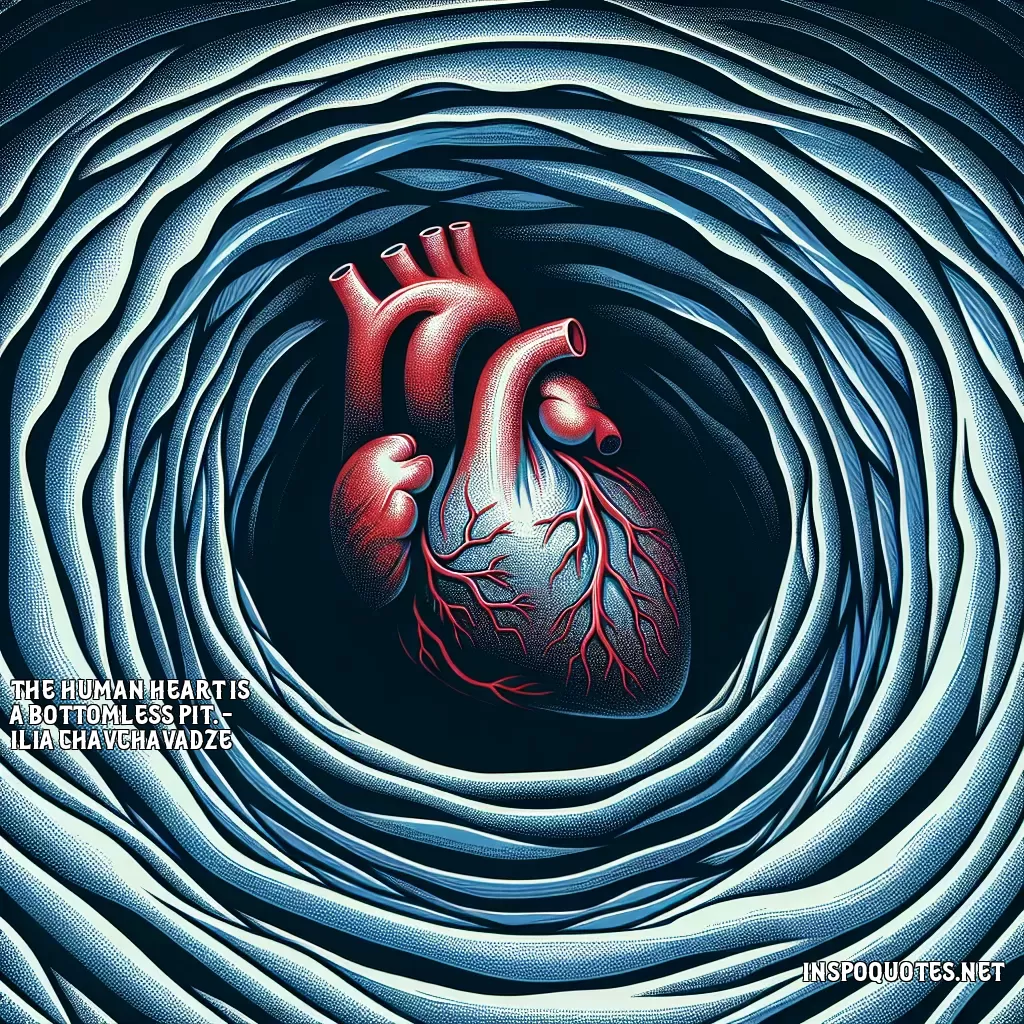
The human heart is a bottomless pit. - Ilia Chavchavadze
Ilia Chavchavadze's quote, "The human heart is a bottomless pit," serves as a profound metaphor that invites a multitude of interpretations regarding the human condition. At its core, this statement suggests that the human heart, representing emotions, desires, and inner depths, possesses an inexhaustible capacity. This notion of a "bottomless pit" conveys a sense of endlessness and complexity. One interpretation is that human emotions and desires are boundless. The heart's capacity to feel is immeasurable, whether it comes to love, longing, ambition, or even pain. This speaks to our innate nature to continuously seek fulfillment, understanding, and connection, an eternal process without a definitive end. It might emphasize the insatiable aspect of human desires; no matter how much we obtain or achieve, our hearts always yearn for more. Another layer of meaning could relate to the heart's ability to endure suffering and to heal. The metaphor of a "bottomless pit" encapsulates the idea that the heart can bear tremendous burdens and still persist. This resilience showcases both vulnerability and strength, illuminating how people can absorb loss and sorrow yet continue to find ways to seek hope and renewal. Furthermore, this quote may also critique the human tendency to harbor insatiable ambitions and desires, which can lead to greed or discontent. It highlights the potential for emotional complexity to drive human actions, sometimes leading to dissatisfaction. Overall, Chavchavadze's portrayal of the human heart as a "bottomless pit" captures the intricacies of emotional and existential experiences, encapsulating the boundless nature of our inner lives.
Quote By: Ilia Chavchavadze
Ilia Chavchavadze (1837-1907) was an influential Georgian author, politician, and public figure, whose life and work played a pivotal role in the cultural and political awakening of Georgia during the late 19th and early 20th centuries. Born in the village of Kvareli in eastern Georgia, Chavchavadze grew up in a period marked by the decline of the Georgian nobility and increasing Russian influence over the region. He received a solid education, which included studying at the Tbilisi Theological Seminary, where he was exposed to a variety of literary and philosophical ideas.
Chavchavadze was not only a gifted writer but also a passionate advocate for the revival of the Georgian language and literature. His literary career began with poetry, and he soon expanded into prose, contributing significantly to Georgian literature. His works often explored themes of national identity, social justice, and cultural heritage. One of his most notable contributions is the establishment of the first modern Georgian periodical, "Iveria," which became a platform for discussing issues pertinent to the Georgian people and fostering a sense of national consciousness. Through his writings, Ilia Chavchavadze sought to inspire his fellow countrymen, urging them to reclaim their cultural identity and heritage.
In addition to his literary pursuits, Chavchavadze was an active participant in the political landscape of Georgia. He advocated for greater autonomy for Georgia and did not shy away from confronting the issues of social inequality. His commitment to the welfare of the Georgian people and his efforts to reform education and promote democracy made him a beloved figure among the intelligentsia and the general populace.
Tragically, Ilia Chavchavadze's life was cut short when he was assassinated in 1907, an event that shocked the nation and underscored the political tensions of the time. His legacy, however, endures in the form of a rich body of literary work and a lasting impact on the Georgian national movement. To this day, Ilia Chavchavadze is celebrated as a national hero, a cultural icon, and a symbol of the fight for Georgian independence and identity. His contributions to literature and society remain a cornerstone of Georgian cultural history.